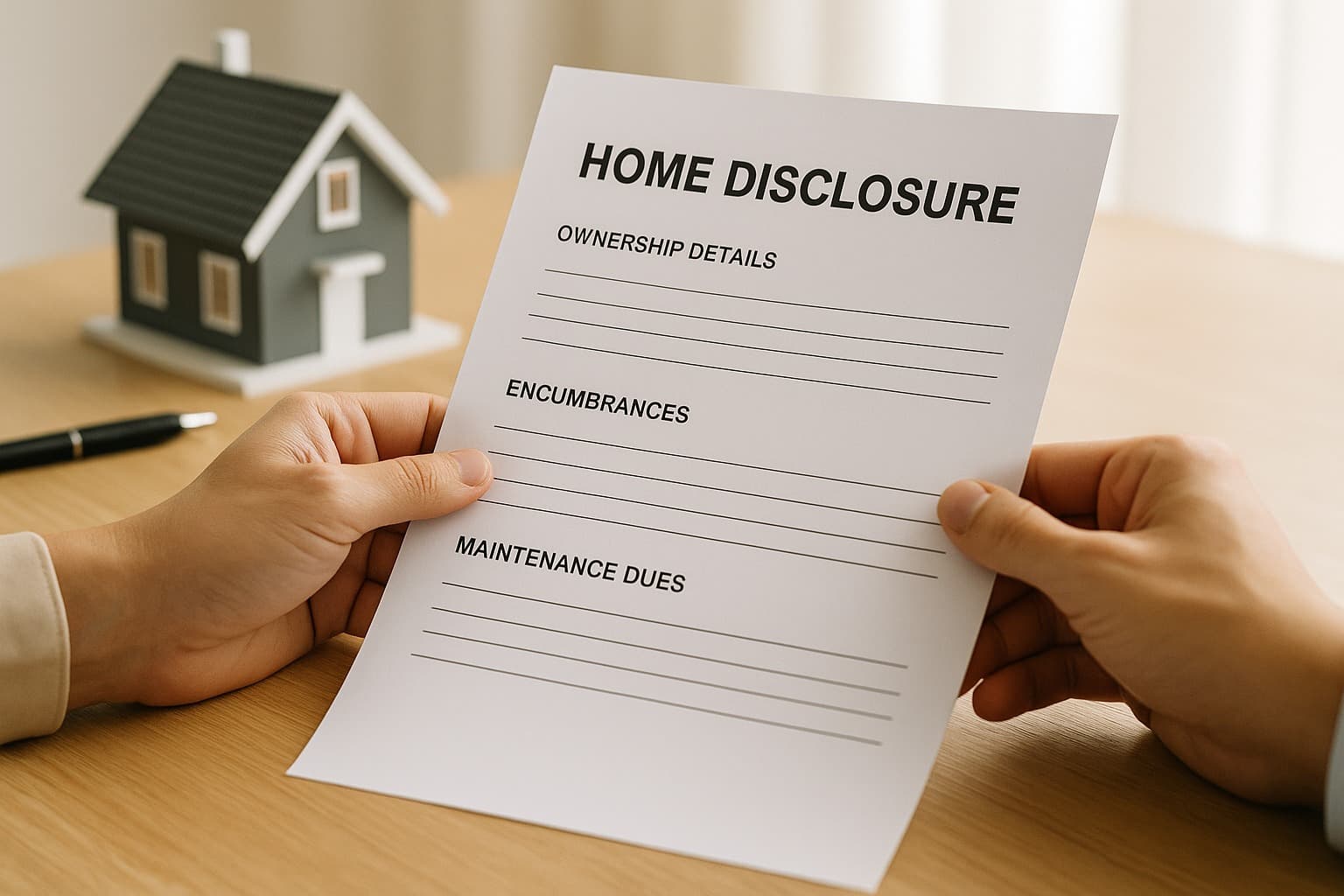What to Disclose to Home Buyers: Legal and Moral Obligations
Summary
Selling a home requires disclosing legal obligations like ownership and encumbrances, and moral ones like structural issues. Transparency builds trust, avoids disputes, and protects sellers. Effective disclosure ensures a smoother, more successful transaction.

What to Disclose to Buyers (Legal & Moral)?
Selling a home is never just a financial transaction. It’s a deeply personal journey, often filled with memories, emotions, and dreams. The walls of your home have seen your life unfold, and the buyers are about to step into a space that may become their sanctuary. Because of this, honesty and transparency are critical. Disclosing the right information to buyers — both legally required and morally responsible — isn’t just about compliance; it’s about building trust, avoiding disputes, and making the selling process smoother for everyone involved.
1. Legal Responsibilities: The Basics You Can’t Ignore
In India, property sellers have clear legal obligations, particularly under laws like RERA (Real Estate Regulation and Development Act, 2016). These obligations exist to protect buyers and ensure that transactions are fair and transparent. Failing to disclose required information can lead to legal complications, delays, or even penalties.
Key legal disclosures include:
Title and ownership details: Buyers have a right to know if the property’s title is clear, free from disputes, and fully owned by you. Any co-ownership issues or inheritance claims must be shared.
Outstanding dues: All pending liabilities, including home loan balances, property taxes, maintenance charges, or utility bills, should be disclosed. Buyers should never inherit unexpected financial burdens.
Encumbrances: Any mortgage, lien, or legal claim against the property must be revealed. Even minor encumbrances, if hidden, can cause serious complications during registration.
Occupancy and tenancy: If the property is rented, details of the tenant agreement, deposits, and rent payments must be shared. Misrepresenting tenancy can lead to disputes.
Regulatory compliance: Ensure the property has proper building approvals, completion certificates, and municipal clearances. Lack of approvals can invalidate a sale and put both parties at risk.
These disclosures aren’t optional — they are legally mandated. Even unintentional omissions can create problems, so it’s important to be thorough and upfront.
2. Moral Obligations: Being Honest Beyond the Law
Legal compliance is one thing, but there’s also a moral responsibility to buyers. This is about integrity and respect. Buyers may not notice minor flaws or past issues, but you know the history. Being upfront prevents future misunderstandings and builds goodwill.
Some key moral disclosures include:
Structural issues: Cracks, water seepage, uneven flooring, or foundation concerns. Even if they’re minor, sharing them allows buyers to make informed decisions.

Pest problems: History of termite infestations, rodents, or other recurring issues. Buyers appreciate honesty, and it allows them to plan treatment if needed.
Repairs and renovations: Major plumbing, electrical work, or unauthorized modifications should be disclosed. Hidden changes can affect safety and resale value.
Neighborhood or environmental issues: Noise, flooding, traffic, or ongoing nearby construction. Sharing this information helps buyers avoid surprises after moving in.
Moral disclosures show that you care about the buyer’s experience and aren’t just focused on making a quick sale. Honesty fosters trust, reduces negotiation friction, and often results in smoother transactions.
3. Benefits of Full Disclosure for Sellers
Being transparent might feel risky — what if it scares buyers or reduces your price? Surprisingly, full disclosure can actually help sellers sell faster and more confidently.
Builds buyer confidence: Buyers are wary of hidden problems. Full disclosure reassures them that they can trust you.
Reduces disputes: Hidden issues often lead to renegotiations, delayed closings, or even lawsuits. Transparent communication prevents these challenges.
Protects legally: Written disclosure serves as proof that you informed the buyer, shielding you from future claims.
Encourages fair offers: Buyers are more likely to make reasonable offers when they know both the strengths and weaknesses of the property.
Transparency can turn a potentially stressful sale into a smooth, mutually respectful transaction.
4. How to Disclose Effectively
Disclosure isn’t about dumping a stack of documents on the buyer. It should be structured, clear, and proactive.
Prepare a written disclosure statement: Include all legal and moral information in clear language, supported with documents whenever possible.
Communicate during viewings: Mention significant disclosures in person, not just on paper. This builds trust and shows integrity.
Involve your agent: If you’re working with a real estate agent, make sure they understand all disclosures. A good agent can present information professionally.
Keep records: Maintain copies of all disclosures, acknowledgments, and communications. Documentation protects you and creates a transparent record.
The key is clarity and honesty. Buyers should feel informed, not like they’re uncovering issues on their own.

5. Common Mistakes Sellers Make
Even well-meaning sellers sometimes make errors. Common mistakes include:
Thinking minor issues don’t matter: Small leaks, termite treatments, or temporary disturbances should still be disclosed.
Relying on verbal promises: Always document disclosures in writing.
Hiding regulatory non-compliance: Missing approvals, unauthorized construction, or incomplete certificates must be shared.
Being vague: Avoid general statements like “everything is fine.” Specificity prevents disputes.
These mistakes often arise from fear that disclosure will reduce price. In reality, honesty builds credibility and often speeds up the sale.
6. Emotional Value of Disclosure
Selling a home is emotional. You may worry that revealing flaws could drive buyers away. But consider the buyer’s perspective: they’re looking for a home to build memories in. Being honest about your property’s history, repairs, and challenges allows them to trust you and make informed choices.
Transparent sellers create positive first impressions. Buyers are more likely to feel confident, respect your property, and sometimes even overlook minor issues because they appreciate the honesty.
7. Legal and Financial Protection
Full disclosure also serves as a protective shield. In India, hiding defects or encumbrances can lead to:
Legal claims under RERA or other property laws.
Financial compensation claims by buyers.
Delays or cancellation of registration.
By disclosing everything upfront, you reduce risk and make the transaction smoother, safer, and faster.
Summary (100 words)
Selling a home responsibly means full transparency. Legally, sellers must disclose ownership details, encumbrances, dues, tenancy, and compliance with RERA and municipal regulations. Morally, sellers should reveal structural flaws, past repairs, pest history, and neighborhood concerns. Full disclosure builds trust, minimizes disputes, and can even accelerate the sale. Effective disclosure involves written statements, clear communication, and proper documentation. Avoid common mistakes like hiding minor issues, relying on verbal assurances, or being vague. Combining legal compliance with ethical transparency ensures a smoother, respectful, and successful home-selling experience for both buyers and sellers, protecting interests and fostering goodwill.
